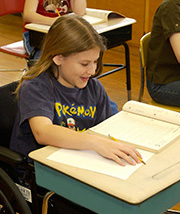What are some reasons to teach reading comprehension strategies in content-area classes?
Page 2: Improving Reading Comprehension
 Having decided to teach reading comprehension strategies to his science students, Mr. Dupree embarks on a journey to learn more. As he had suspected, good readers automatically use comprehension strategies, but poor readers do not. He learns, however, that these comprehension strategies can be taught to poor readers. To do so, Mr. Dupree will make use of the four elements described below.
Having decided to teach reading comprehension strategies to his science students, Mr. Dupree embarks on a journey to learn more. As he had suspected, good readers automatically use comprehension strategies, but poor readers do not. He learns, however, that these comprehension strategies can be taught to poor readers. To do so, Mr. Dupree will make use of the four elements described below.
- Prior knowledge: Students are taught to think about what they already know about a particular topic. Next, students are asked to try to make a connection between their prior knowledge and the text they are reading.
- Vocabulary development: Students are taught to use diagrams or graphic organizers to help them to learn and remember the meanings of new words.
- Questioning techniques: Students are taught to generate questions before, during, and after reading. Students are asked to predict what they are going to read, to ask themselves during reading whether what they have read makes sense, and to generate questions about the text after reading.
- Opportunities to practice new skills: Students are given ample time in the day for independent reading and are encouraged to share what they have read.

Good readers, like Sylvia, use various strategies to help them to organize, evaluate, and remember the information they encounter in expository texts. More specifically, before, during, or after reading, they may:
- Clarify their purpose for reading
- Make a plan for how to read the text
- Connect information to their prior knowledge
- Ask questions about the text
- Monitor their comprehension

By contrast, poor readers, like Renee, lack knowledge of such strategies. They tend to comprehend little because they do not know how to make sense of the information they encounter in expository texts. Often, poor readers:
- Focus on decoding words
- Do not see connections among parts of the text
- Do not realize that they do not understand what they have read
- Do not understand the concept of reading for meaning